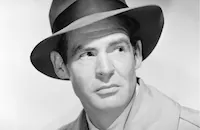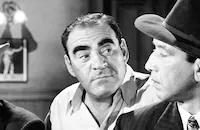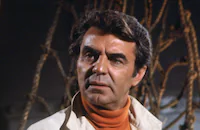The Secret Fury

Brief Synopsis
Cast & Crew
Mel Ferrer
Claudette Colbert
Robert Ryan
Jane Cowl
Paul Kelly
Philip Ober
Film Details
Technical Specs

Synopsis
As concert pianist Ellen Ewing and architect David McLean are about to be wed, a stranger interrupts the ceremony to declare that Ellen is already married to a man named Lucian Randall. Ellen is stunned by the accusation, but because a telephone inquiry to Fairview, California, where the marriage supposedly took place, supports the man's statement, she is forced to stop the wedding. That same day, Ellen and David drive to coastal Fairview, where Ellen has a vacation home, with Ellen's aunt Clara and her longtime guardian, lawyer Gregory Kent. After confirming that Ellen's signature is indeed on the marriage license, the group questions Roy Palmer, the justice of the peace who supposedly performed the March wedding. Palmer, his wife and a witness all claim to remember Ellen and address her as "Mrs. Randall." That night, in a hotel room that Gregory has reserved for her, Ellen tries to recall her previous wedding day. Before she can share her recollections with David, however, Leah, a hotel maid, comes in wearing Ellen's mother's pin, which she claims Ellen gave to her on her wedding night. Leah then insists that Ellen had been there in March with her husband, "Mr. Randall." After Leah leaves, Ellen describes to David the walk she took the day before the wedding and suggests that if she can clearly remember the walk, she could not have forgotten getting married. At dinner, however, a distraught Ellen confides to David the possibility that she may have amnesia. Although David believes in Ellen's innocence, Ellen insists that they visit Randall in person. While they wait to talk with Randall at a private party, Ellen describes a boat she saw during her beach walk, whose name she remembers as "Noosnom." After Randall tells David that Ellen is indeed his wife, she leaves for a private talk with her "husband." As he waits for Ellen, David hears a gunshot and is horrified to discover that Randall has been shot to death, and Ellen is the prime suspect. Ellen is prosecuted for murder by District Attorney Eric Lowell, who also happens to be her former suitor, and is defended by Gregory. During the trial, Randall is revealed to be a convicted blackmailer, and Eric accuses Ellen of killing him in order to stop his blackmail of her. At first, Ellen denies all of Eric's charges, but as the district attorney's words become more pointed, she becomes hysterical and admits she is unsure about what happened to Randall. The convicted Ellen is then sent to an insane asylum, where she falls into a semi-catatonic state. Although Ellen's doctor speaks discouragingly to David about her condition, David decides to fulfill Ellen's request to have her wedding dress brought to her. While he is retrieving the dress from Ellen's Fairview house, David finds a seashell she had described to him earlier. On a hunch, David goes to the beach and spots a boat whose name, when viewed upside down in the water, spells "Noosnom." Inspired, David questions the man who issued Ellen's marriage license and learns that the woman who signed Ellen's name had a scar on her hand. David then returns to Roy Palmer's house, but discovers that no one by that name has ever lived there. Sensing a pattern, David finds Leah at the hotel, and for a fee, she offers to tell him the whole story after work. Just as David is about to meet with Leah, however, she is strangled by a wire-wielding man. After David finds Leah's body and notices the scar on her hand, he is attacked by the same man while driving his car. David saves himself, but loses his would-be killer when he jumps out of the car after it crashes into a ditch. Later, David and Gregory visit Ellen at the asylum to tell her she has been cleared of all charges. Ellen is at first overjoyed, but then cries out in fear and runs from the room. That night, at her aunt Clara's house, Ellen appears with a gun and accuses Gregory, whose distinct mannerisms she recalled seeing just before Randall was killed and then later recognized at the asylum, of framing her. After admitting his guilt, Gregory reveals that Ellen's father, a judge, had wrongfully sent him to an insane asylum. To exact revenge, he says, he plotted against Ellen, killing Randall himself and hiring another man to murder Leah and David. Gregory then tries to force Ellen to attack him, so that she will shoot him and be forever incarcerated as a mad woman. Before Gregory can complete his deed, however, David arrives and, while fighting with the lawyer, causes a large mirror to fall on top of him. With Gregory's death, Ellen is finally free.

Director

Mel Ferrer
Cast

Claudette Colbert

Robert Ryan

Jane Cowl

Paul Kelly

Philip Ober

Elisabeth Risdon
Doris Dudley
Dave Barbour
Vivian Vance

Jose Ferrer
Percy Helton
Dick Ryan
Ann Codee
Joseph Forte

Edit Angold
Adele Rowland
Howard Quinn
John Mantley
Herbert Evans
Marjorie Babe Kane
Marion Hays

Ralph Dunn
Ruth Robinson
Pat Barton
Charmienne Harker

Willard Parker
Eddie Dunn
Cliff Clark
Vivien Oakland
Margaret Wells
Burk Symon
Gene Brown

Paul Picerni
Frank Neill
Dave Cicero
Aline Mosby
Harold Swisher
Harold Hefferman
Leslie Snyder
Wheaton Chambers
Bert Moorhouse
Vangie Beilby
June Benbow
Sunny Boyne
Connie Van
Gail Bonney
Clifford Brooke
Jacqueline Park
Frank Scannell
Joel Friedkin
Bert Kennedy
Hal Schaefer
Vido Musso
Alvin Stoller
Walt Yoder
Ernie Royal
Aileen Babs Cox
Abe Dinovitch
Mike Lally
Carl Sklover
Art Dupuis
Crew
C. Bakaleinikoff
Mel Berns
Hattie Carnegie
Carroll Clark
Albert S. D'agostino
Larry Germain
Lionel Houser
Jack R. Leonard
Bruce Manning
Harry Marker
James O'hanlon
Clem Portman
Max Rabinowitsh
Sam Ruman
Darrell Silvera
Art Siteman
Jack H. Skirball
Jack H. Skirball
William Stevens
Leo Tover
Roy Webb
Earl Wolcott
Michael Woulfe

Film Details
Technical Specs

Articles
The Secret Fury
The intriguing opening finds Colbert, a successful pianist, preparing to marry Robert Ryan, an architect. But during the ceremony, a man interrupts to announce that Colbert is already married. There appears to be some evidence of this and the wedding is stopped. A check at the records office reveals that Colbert's previous supposed wedding is fully documented and was witnessed, even though she doesn't recall it. Colbert and Ryan proceed to track down the first "husband," but then there's a murder and Colbert is suspected, and she becomes increasingly unstable -- as does the believability of the plot.
While The Secret Fury may not have been Colbert's best career decision, she and Ryan are such wonderful, watchable actors that even a misfire is worth a look. Colbert had agreed to do this film if Mel Ferrer directed, and Ferrer ended up drawing a great deal of blame from reviewers at the time. Variety said the "script is inclined to talkiness but development does generate some interest as the mad scheme unfolds under Mel Ferrer's direction. Latter is tricky and could have stood more movement.... Little suspense or thrills in Ferrer's directorial mood. Characters never take on much reality." The New York Times blasted the film, calling it "nonsense... cheap and lurid twaddle, wantonly unintelligent."
New Jersey-born Mel Ferrer was primarily an actor on stage and screen in his showbiz career, though he did delve into directing and producing as well. In the 1940s he worked as dialogue coach on a number of B films and even was John Ford's assistant on The Fugitive (1947). The Secret Fury was his second feature as director. The same year, he played a supporting acting role in Born to Be Bad (1950), directed by Nicholas Ray and starring his Secret Fury male lead, Robert Ryan. Four years later Ferrer married Audrey Hepburn, his fourth of five wives. He acted with her in War and Peace (1956) and directed her in Green Mansions (1959).
Claudette Colbert, born in France as Emilie Claudette Chauchoin (she moved to America at age 3), made The Secret Fury as a follow-up to Three Came Home (1950), a fine WWII prison drama. Within a few years, Colbert would mostly vanish from the big screen in favor of a television career over the next decade until she retired in 1961, notwithstanding a final TV movie appearance in 1987.
Producer: Jack H. Skirball
Director: Mel Ferrer
Screenplay: Lionel Houser; Jack R. Leonard, James O'Hanlon (story)
Cinematography: Leo Tover
Art Direction: Carroll Clark, Albert S. D'Agostino
Music: Roy Webb
Film Editing: Harry Marker
Cast: Claudette Colbert (Ellen R. Ewing), Robert Ryan (David McLean), Jane Cowl (Aunt Clara Ewing), Paul Kelly (District Attorney Eric Lowell), Philip Ober (Gregory Kent), Elisabeth Risdon (Dr. Twining), Doris Dudley (Pearl Collins), Dave Barbour (Lucian Randall), Vivian Vance (Leah).
BW-86m. Closed Captioning.
by Jeremy Arnold

The Secret Fury
Quotes
Trivia
Notes
The working title of this film was Blind Spot. According to a Los Angeles Times news item, the title of Jack R. Leonard and James O'Hanlon's original screen story was "The Wind Is Blind." In July 1949, Ida Lupino was announced in Hollywood Reporter as the film's probable star. According to a September 1949 Los Angeles Times item, Claudette Colbert, who, along with Jack Skirball was a partner in Loring Theatre Corp., agreed to star in the film on condition that Mel Ferrer direct. According to a contemporary news item Max Rabinowitsh dubbed Colbert's piano solos. New York stage actor Philip Ober and his then wife, Vivian Vance, made their screen debuts in this picture.














